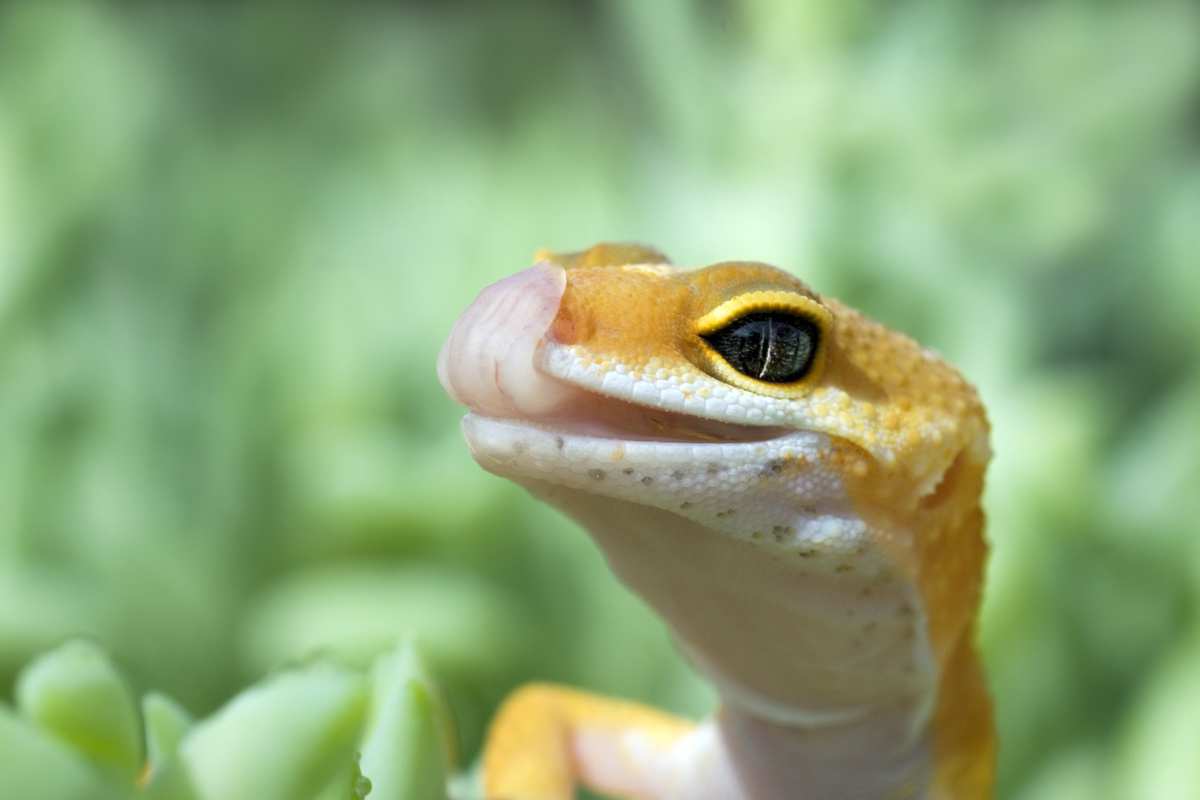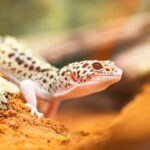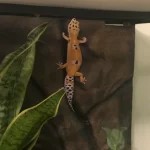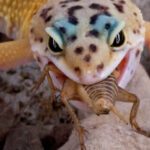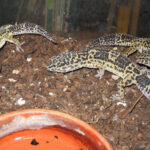Leopard geckos are fascinating reptiles that use their tongues in some interesting ways. One behavior you may notice is tongue flicking, where a gecko quickly flicks its tongue in and out of its mouth. This serves an important purpose for the gecko. Let’s take a closer look at leopard geckos Tongue flicking behaviour, what information they gather, and how this ability helps them survive.
Table of Contents
Why Do Leopard Geckos Flick Their Tongues?

Leopard geckos flick their tongues to collect chemical molecules from the air. Their tongues work like tiny sticky traps that capture scents and flavors. When the tongue retracts back into the mouth, these molecules stick to special organs called the vomeronasal or Jacobson’s organs. These organs send signals to the brain that provide all kinds of information about the gecko’s environment.
Tongue flicking allows leopard geckos to achieve the following:
- Detect predators and prey – Geckos can sense where a tasty cricket is hiding or if a dangerous snake is nearby.
- Identify territories – Geckos gather chemical cues from the environment that tell them whose territory they are in.
- Find mates – Male geckos can detect when a female is receptive through chemical signals she gives off.
- Pursue prey – Geckos can follow scent trails left behind by insects and other invertebrates.
- Gather information – Flicking their tongues helps geckos collect large amounts of data about their surroundings. This information aids their survival.
Tongue Flicking Frequency
Leopard geckos flick their tongues fairly frequently while they are active. You may notice your gecko flicking its tongue every 10-30 seconds as it moves around its habitat exploring.
Tongue flicking frequency increases when a gecko encounters a new environment or is actively hunting. It may flick its tongue multiple times per second when hot on the trail of prey or checking out a new object you placed in its terrarium.
A healthy leopard gecko is almost constantly gathering chemical information from its environment. So tongue flicking is a very common and normal behavior you can expect to see.
What Causes Tongue Flicking?
Leopard geckos flick their tongues in response to smelling chemical odor molecules in the environment. As air currents pass through their habitat, molecules become dispersed in the air. Special organs in the gecko’s nasal passages and mouth detect these chemicals.
In response, the brain stimulates the gecko to flick its tongue to collect a sample. Nerves in the tongue likely also help trigger this reflex.
Once the gecko draws its tongue back into its mouth, the chemicals stick to the Jacobson’s organs. Sensory cells detect their makeup, sending signals to the brain areas that process smells and tastes.
Differences Between Males and Females
Both male and female leopard geckos flick their tongues to collect chemical cues from their environment. But some research suggests adult males may flick their tongues more frequently than females in some situations.
One study exposed male and female leopard geckos to chemical stimuli from potential prey and non-prey sources. The researchers observed that males tended to flick their tongues faster in response to prey odors compared to females.
Another study found that male geckos flicked their tongues significantly more than females when exposed to pheromones from female skin. The males likely were gathering chemical information to help them locate potential mates.
These studies suggest male geckos may be slightly more attentive to chemical signals relevant to activities like mating and hunting prey. Both sexes share the tongue flicking behavior, but their responses may differ in some contexts.
Unusual Tongue Flicking
While tongue flicking is normal, excessive flicking can sometimes indicate a health issue in leopard geckos. Parasites, respiratory infections, and dehydration are among the problems that can cause more frequent tongue movements.
You may also see a gecko flick its tongue abnormally far outside its mouth. This can happen due to calcium deficiency, metabolic bone disease, or neurological issues.
If your leopard gecko is flicking its tongue much more than usual, sticking its tongue out too far, or showing other signs of illness, contact your exotic veterinarian. Proper treatment can help resolve the underlying issue.
Importance of Tongue Flicking for Survival
A leopard gecko’s long, sticky tongue provides key information about its environment. This helps geckos find critical resources like food, water, shelter, and mates. Sensing chemical signals also allows geckos to avoid potential threats from predators.
Tongue flicking gives geckos an evolutionary advantage over reptiles without this ability. Those able to detect more information about their surroundings can navigate environments more effectively. They stand a better chance of surviving and passing along their genes.
Over thousands of generations, natural selection likely favored geckos that used tongue flicking to scope out territory and locate essentials like insects to eat. This behavior remains deeply embedded in the leopard gecko species today.
Caring for Your Pet’s Tongue Health
As a leopard gecko owner, it’s important to support your pet’s tongue health. This ensures your gecko can perform natural chemical-sampling behaviors.
Follow these tips:
- Provide a calcium-rich diet, including gut-loaded insects
- Dust food with calcium + D3 supplement
- Use a vitamin supplement 2-3 times weekly
- Ensure access to clean, fresh water
- Avoid housing geckos on coarse substrates
- Watch for signs of metabolic bone disease
- Schedule wellness checks with an exotic vet
With proper care, your gecko can flick its tongue to its heart’s content and keep its sensory system working perfectly.
The Next Time You See Tongue Flicking
The next time you see your leopard gecko flicking its forked tongue in and out, you’ll understand why. This is normal behavior that helps your pet gather lots of meaningful information about its environment. Tongue flicking allows geckos to detect food, threats, mates and territory boundaries – all important for survival.
So when you witness frequent tongue movements, your gecko is simply doing what comes naturally. Its specialized tongue and Jacobson’s organs work together to provide an evolutionary advantage passed down over many leopard gecko generations. With improved sensory abilities, geckos can more successfully occupy their ecological niche. I sincerely hope you find this “Tongue flicking behaviour in Leopard geckos” article helpful.

